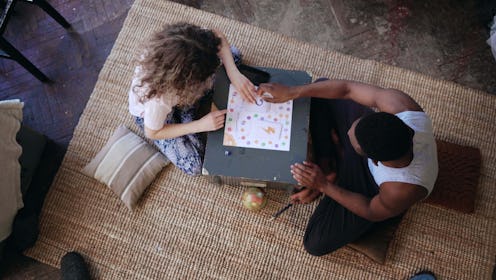(Living)
The Non-Sexual Activity Science Says Will Strengthen Your Relationship While You Isolate

By now, you have probably self-isolated or quarantined yourself and — for those cohabiting with a significant other — this might be the first time you are with your partner 24/7. After watching everything Netflix has to offer, enjoying spontaneous lovemaking sessions, and cooking every meal together, there's still time (and boredom) to kill. Enter an often-forgotten childhood pastime: board games. Remember when you used to find so much joy in a round of Scrabble or Twister? Well, turns out, there are plenty of board games for couples that can actually draw you closer and strengthen your bond.
“It is important to bring in various forms of activities such as board games because a relationship is built on equal amounts of safety and mystery," explains Nikki Nachum, LMFT. "We need to stay open to learning new things about our partner and seeing them in a different light to keep the relationship thriving and alive. Playing board games opens the possibilities to entertain each other and reveal more of oneself to their partner. Couples who play together, stay together."
The Los Angeles-based therapist goes on to explain that actually shed light on the traits and dynamics that made you fall in love with your partner in the first place: humor, teasing, strategizing, focus, or collaboration. "The death of a relationship is when you assume you know everything about your partner and forget to constantly be willing to learn more about them, they may surprise you and you can fall more in love," says Nachum.
In a scientific study conducted by Baylor University on the effects of recreational activities for couples, it was found that board games released oxytocin in both males and females. It was inferred that the release of oxytocin while playing board games was caused by bonding, attachment, emotions, and social memory. How much oxytocin released in couples was dependent on the novelty of the game or setting.
The novelty factor of playing board games at home stems from the change in routine. “If you continue to do the same activities over and over again you'll start to feel fatigued," explains relationship and dating coach and author, Carla Romo. "Changing it up can help create a new and exciting dynamic between the two of you. It gives you the space to have surface-level disagreements in a fun, healthy, and competitive way that can help ignite that excitement."
Nachum suggests finding a game that fits your personal style. “Take some time to search for the game that speaks to you," she says. For instance, the therapist finds that Twister can be a fun go-to because of the nostalgia it evokes from one’s childhood and the playful physical connection that can help couples get back into their bodies and be silly together. “Loopy is a new game for couples, provoking questions and actions that help you learn new things about your partner and ignite feelings of deeper connection and passion," says Nachum. "Trivial Pursuit is another throwback and a fun game to play for the history buffs. Games that keep us on our toes and challenge our minds are great to help shift any stagnant energy and lift the mood to a new playful space."
But if you don’t own any physical board games, Romo suggests online board games. “Besides playing online, I love suggesting couples to play these games: Scrabble because you can theme it and spell out words to describe one another, making it a great opportunity to complement each other, [...] and Are You Normal?, which is a perfect game to get to know your partner on a totally new level while finding out what you do have and don't have in common,” shares Romo.
So instead of binge-watching every streaming service out there try getting into a board game for some flirty competition and banter to keep the spark alive.
We only include products that have been independently selected by The Zoe Report's editorial team. However, we may receive a portion of sales if you purchase a product through a link in this article.
If you think you’re showing symptoms of coronavirus, which include fever, shortness of breath, and cough, call your doctor before going to get tested. If you’re anxious about the virus’s spread in your community, visit the CDC for up-to-date information and resources, or seek out mental health support.
This article was originally published on